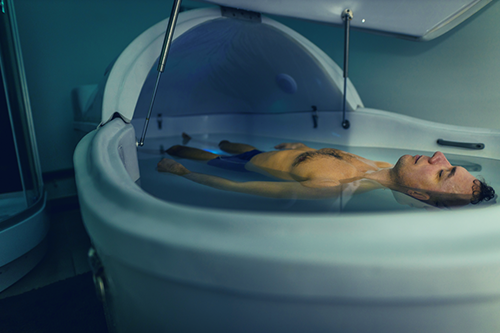Ah, to be adrift and floating in a lightless, soundless sensory deprivation tank filled with warm Epsom salt water to relax and unwind. There are few comparable ways to decrease stress and anxiety while increasing muscle relaxation, reducing pain, and improving sleep.
The health and wellness benefits float tanks can provide are why they became popular in the 1970s. Nowadays, the use of float tanks in several types of businesses is common.
Floating – or REST (Restricted Environmental Stimulation Technique) therapy – silences the outside world and gives users a sense of being gravity-free in total darkness. However, business owners offering float therapy need to keep their feet planted firmly on the ground and protect their assets from the liability risks associated with float tanks by purchasing a comprehensive float tank insurance policy.

Download Our FREE Insurance Guide
Learn everything you need to protect your small business.
Whitepaper - Business Insurance
"*" indicates required fields
Your email address will be used by Zensurance to provide latest news, offers and tips.
You can unsubscribe at any time.

What Types of Businesses Have Float Tanks?
Float tanks, sensory deprivation tanks, or isolation tanks, are primarily used in the health and wellness and spa industries. Float tanks offer a unique sensory experience for clients seeking stress relief and mental relaxation.
Businesses that may offer their clients the opportunity to use a float tank include:
Floatation Centres
Floatation centres or float spas specialize in offering floatation therapy as a primary service.
Spas and Wellness Centres
Many traditional spas and health and wellness centres have float tanks to complement their other services, such as massage therapy, facials, and other relaxation treatments.
Health and Rehabilitation Facilities
Some healthcare facilities, including hospitals, physical therapy clinics, and rehabilitation centres, have float tanks as part of holistic treatment programs for patients recovering from injuries, managing chronic pain, or seeking alternative therapies for mental health conditions.
Fitness and Yoga Studios
Fitness and yoga studios may offer float tank sessions as an additional amenity for members or as part of specialized wellness programs.
Holistic Health Clinics
Holistic health practitioners, such as naturopathic doctors, chiropractors, and acupuncturists, may recommend float tanks in patient treatment plans to support overall health and wellness.
Resorts and Retreat Centres
Luxury resorts, boutique hotels, and wellness retreats may feature float tanks as part of their spa and wellness amenities, offering guests a unique and immersive relaxation experience during their stay.
Corporate Wellness Programs
Some businesses incorporate float tank sessions into their corporate wellness programs as a perk for employees to promote stress reduction, mental clarity, overall well-being, and productivity.
10 Liability Risks Businesses With Float Tanks Face
Although float tanks are designed to promote health, wellness, mental clarity and relaxation, small businesses or health and wellness practitioners using these devices face several liability risks. Here are 10 of the most common ones:
1. Slip and Fall Accidents
Slip and fall accidents pose one of the biggest liability risks businesses using float tanks face. A client falling while entering or exiting the float tank, potentially resulting in injuries such as sprains, strains, or fractures, can lead to expensive claims. Wet floors around the float tank increase the risk of slip and fall accidents.
2. Drowning or Near-Drowning Incidents
Float tanks are filled with shallow water containing a high concentration of Epsom salt, allowing individuals to float effortlessly. However, there is a risk of drowning if clients accidentally ingest water or become disoriented while inside the tank.
3. Lawsuits
Your clients or visitors to your clinic or business could launch a lawsuit or legal claim against you alleging bodily injury, property damage, or other losses resulting from accidents or incidents associated with your float tanks. Even a frivolous lawsuit without merit can cost you thousands of dollars to hire legal counsel and defend your business.
4. Allergic Reactions or Skin Irritations
Some individuals may experience allergic reactions or skin irritations from exposure to Epsom salt or other chemicals used to maintain water quality in the float tank.
5. Infections or Contamination
Improper cleaning and maintenance of float tanks can lead to bacterial or fungal water contamination, increasing the risk of infections.
6. Client Safety and Supervision
Clients may experience anxiety or discomfort while inside the float tank, especially if they are claustrophobic or prone to panic attacks.
7. Equipment Malfunctions
Malfunctions or defects in float tank equipment, such as filtration systems, heating elements, or sensory control mechanisms, can pose safety hazards to clients.
8. Failure to Provide Adequate Instructions or Warnings
Businesses must provide clients with clear instructions on using the float tank safely and effectively. Failing to do so may increase the likelihood of accidents or injuries.
9. Claims of Negligence or Professional Misconduct
Clients may allege negligence, errors, or professional misconduct on the part of the business or its staff, such as improper supervision, inadequate maintenance, or failure to address client concerns promptly.
10. Regulatory Compliance
Businesses must comply with local health, safety, and sanitation regulations governing the operation of float tanks and wellness facilities. Non-compliance can result in expensive fines, penalties, or legal liabilities.
What Type of Insurance Covers Liabilities Related to a Float Tank?
Business insurance for float tanks requires a customized and comprehensive policy that includes several coverages. The coverage your spa, business, or wellness facility requires depends on your business’s unique elements and requirements.
A typical float tank insurance policy may include these coverages:
- General Liability Insurance: Also called slip-and-fall insurance, general liability covers your business for third-party bodily injury and third-party property damage claims. For instance, if one of your clients slips and falls after existing one of your float tanks and is hurt, general liability insurance is designed to cover their medical and rehabilitation expenses.
- Professional Liability Insurance: Professional liability insurance, or errors and omissions (E&O) insurance, protects you from claims and allegations of professional negligence related to your advice or services. This type of protection is known as medical malpractice insurance for medical and wellness practitioners. It also covers claims of errors, misconduct, misrepresentation, and failure to deliver a service as promised.
- Product Liability Insurance: Any business or practitioner can be liable for any product they manufacture, distribute, or sell. Product liability insurance protects your finances and reputation from claims alleging third-party bodily injury or third-party property damage from the products you provide or sell to your clients. For example, if your spa sells moisturizers, and one of your clients suffers an allergic reaction after using it, you can be held financially responsible for their injuries even if you didn’t manufacture the product.
- Commercial Property Insurance: Whether you own, rent, or lease float tanks, they and other equipment, furnishings, and contents and inventory in your clinic or business need coverage for unexpected events. That includes the building you’re located in, too. That’s what commercial property insurance provides: protection against damage and loss resulting from fire, water damage, a natural disaster (like a severe windstorm that damages your clinic), vandalism and theft.
- Equipment Breakdown Insurance: Whereas commercial property insurance covers your equipment and contents from external damages beyond your control, equipment breakdown insurance pays to repair or replace your float tanks if they suddenly cease to operate because of an internal electrical or mechanical malfunction.
- Umbrella Liability Insurance: Think of umbrella liability insurance as an extra layer of financial protection that kicks in if your existing coverage limits are exhausted after filing a claim. You must have commercial property or commercial auto insurance to add umbrella liability coverage to your policy, as it only applies to extending the coverage limits for third-party bodily injury or property damage claims.
Speak to a licensed Zensurance broker if you have questions about what your policy should contain and its coverage limits.
How to Get Low-Cost Float Tank Liability Insurance Today
Get the customized, affordable float tank liability business insurance your organization needs from Zensurance.
Fill out our online application to get a free quote. With over 50 Canadian insurers in our partner network, our knowledgeable brokers can get the low-cost protection you need and customize a policy to suit your risks and budget.
Recent Posts
Small Business Calendar 2026: Key Dates for Business Owners in Canada
Starting a new year on the right track is essential. But there are some dates and deadlines no small business owner or independent professional should overlook or forget. See our list of important dates to help stay on track in 2026.
Bundling Business Insurance: Can It Save You Money?
If you’re looking for a clearer, cheaper, and more convenient approach to business insurance, purchasing a bundled business insurance policy may be your best option. Here’s how to decide what works best for you.
10 Ways to Safeguard Your Small Business During the Winter
Winter's icy wrath can damage your business property or cause accidents that lead to liability claims. See our recommendations for protecting your property and finances throughout the winter and reducing the chances of suffering costly losses.








